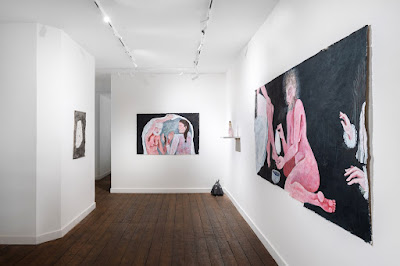Marlene Steyn at Lychee One
With many exhibitions I currently find myself encountering, not all of which I document here, there seems to be a recurring motif of feminist values which are not necessarily striking, but instead implicitly pack some significance when it comes to highlighting female alliances and communities remaining dynamic in the name women's empowerment. At Lychee One, E2, South African artist Marlene Steyn's paintings convey female solidarity and preexisting trauma, without being overtly explicit. Using this strategy, her work speaks seemingly directly to a female viewer in a lyrical, compelling way.
Marlene Steyn, Cry Me a Swimming Pool. Lychee One, London.
'Cry Me a Swimming Pool' is the first proof of the artist using dark humour in her work, and with the aesthetically charming, pastel palettes which are repeatedly used, this almost paradoxical effect ensures that the viewer is drawn to the intricate content of Steyn's paintings. 'Cry Me a Swimming Pool' twists the idiom 'cry me a river', which is a highly tongue-in-cheek phrase used as an expression of lack of sympathy. Interestingly, a swimming pool is a controlled, artificial environment in which water is invariably present, and notably the female figures are not drowning in their own tears, both individually and collectively, but are living within them, immersed in them. Each figure is identical, which potentially overlooks the significance of intersectional feminism in the age we are living in, however the bodily hairs prominent on each character's arms and legs are certainly an addition we are supposed to notice, showcasing the raw, honest space of this all-female environment.
The symbolism of water continues past the show's opening work and splashes into 'Wishy Washy Touchy Touchy', in which the artist extends her use of paint beyond the canvas, so that the territory of artist and viewer is blurred, and we are enveloped in the work. Again there is a sinister edge to this painting, as the central figure is nude therefore deemed vulnerable, regardless of its art historical or new-wave feminist interpretations. Further to being exposed, the water symbolism evokes feeling of drowning, contrary to the previous piece of idleness and partial submission. The medium of paint for these works also contributes much to the analysis of 'You Can't Cry When Your Head is Underwater', as it is now considered to be a dying form in contemporary art practice. Paint extending beyond the canvas as part of 'Wishy Washy Touchy Touchy' transforms the work into the realm of design, as the viewer then engages with the patterns adorning the gallery walls and their meanings.
Other ways of creating this affinity with Steyn's viewers is established through sculptural installation pieces, including 'All She Wanted Was to Be a Flying Buttress', which sees a hanging wooden swing beneath a small painted bronze sculpture of three sets of legs positioned one on top of the next. Using a swing makes reference to the child-like charm possessed by many of the pieces as an initial impression, and the imagery of water reemerges as the wooden swing is painted blue and the motion of the grain is reinforced with a darker shade of blue, thus successfully recreating the motif of artificial forms of water, further from the swimming pool. Unpacking this presents an interesting critique on the societal, as opposed to natural, discrimination of women and those identifying as female. Perhaps reining everything together is a small yet powerful piece on linen, 'Sister's Shoulders', subverting the familiar imagery of evolution to symbolise, instead, the transhistorical struggle of the female condition. Tragically, we are reminded that these same struggles and traumas are likely to outlive ourselves and transcend the generations, and at times it seems that there are limited practical, active solutions to the problems women face, which have not changed drastically throughout time.
Marlene Steyn, Sister's Shoulders, 2016. Oil and mixed media on linen. Lychee One, London.




